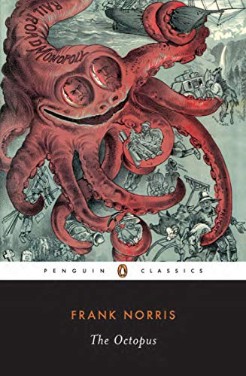Just after passing Caraher's saloon, on the County Road that ran south from Bonneville, and that divided the Broderson ranch from that of Los Muertos, Presley was suddenly aware of the faint and prolonged blowing of a steam whistle that he knew must come from the railroad shops near the depot at Bonneville. In starting out from the ranch house that morning, he had forgotten his watch, and was now perplexed to know whether the whistle was blowing for twelve or for one o'clock. He hoped the former. Early that morning he had decided to make a long excursion through the neighbouring country, partly on foot and partly on his bicycle, and now noon was come already, and as yet he had hardly started. As he was leaving the house after breakfast, Mrs. Derrick had asked him to go for the mail at Bonneville, and he had not been able to refuse.
He took a firmer hold of the cork grips of his handle bars—the road being in a wretched condition after the recent hauling of the crop—and quickened his pace. He told himself that, no matter what time was, he would not stop for luncheon at the ranch house, but would push on to Guadalajara and would have a Spanish dinner at Solotari's, as he had originally planned.
There had not been much of a crop to haul that year. Half of the wheat on the Broderson ranch had failed entirely, and Derrick himself had hardly raised more than enough to supply the seed for the winter's sowing. But such little hauling as there had been had reduced the roads thereabouts to a lamentable condition, and during the dry season of the past few months, the layer of dust had deepened and thickened to such an extent that more than once had Presley was obliged to dismount and trudge along on foot, pushing his bicycle in front of him.
It was the last half of September, the very end of the dry season, and all Tulare County, all the vast reaches of San Joaquin Valley—in fact, all south central California, was bone dry, parched, and baked and crisped after four months of cloudless weather, when the day seemed always at noon, and the sun blazed white hot over the valley from the Coast Range in the west to the foothills of the Sierras in the east.
As Presley drew near to the point where what was known as the Lower Road struck off through the Ranchos de los Muertos, leading on to Guadalajara, he came upon one of the company watering-tanks, a great, iron-hooped tower of wood, straddling clumsily on its four uprights by the roadside. Since the day of its completion, the storekeepers and retailers of Bonneville had painted their advertisements upon it. It was a landmark. In that reach of level fields, the white letters upon it could be read for miles. A watering-trough stood near by, and, as he was very thirsty, Presley resolved to stop for a moment to get a drink.
He drew abreast of the tank and halted there, leaning his bicycle against the fence. A couple of men in white overalls were repainting the surface of the tank, seated on swinging platforms that hung by hooks from the roof. They were painting a sign—an advertisement. It was all but finished and read, "S. Behrman, Real Estate, Mortgages, Main Street, Bonneville, Opposite the Post Office." On the horse-trough that stood in the shadow of the tank was another freshly painted inscription: "S. Behrman Has Something To Say To You."
